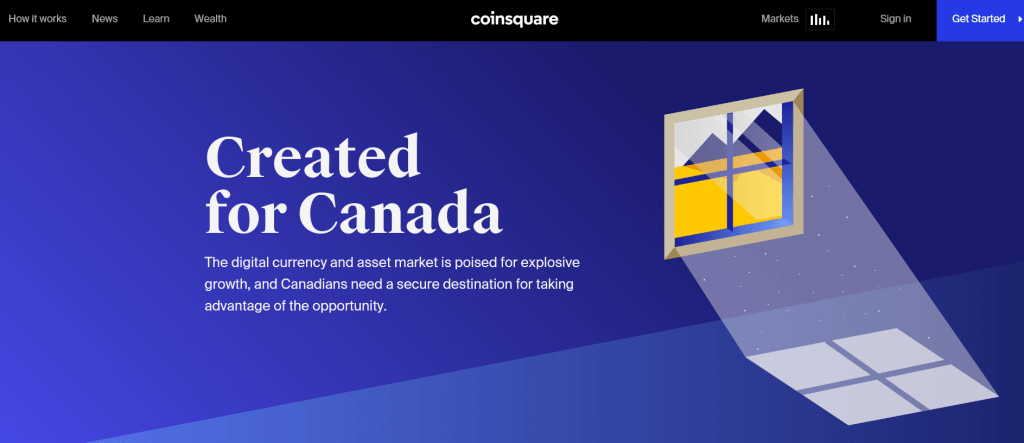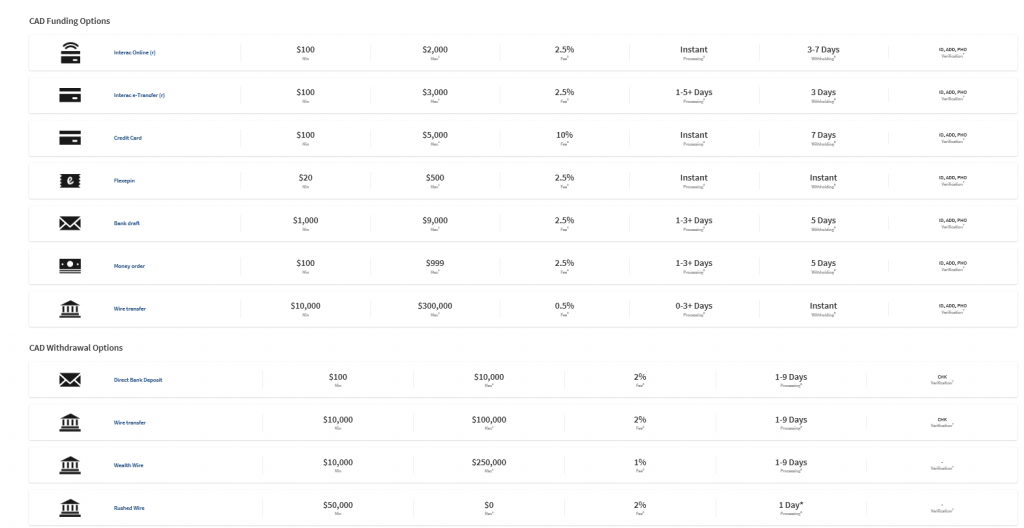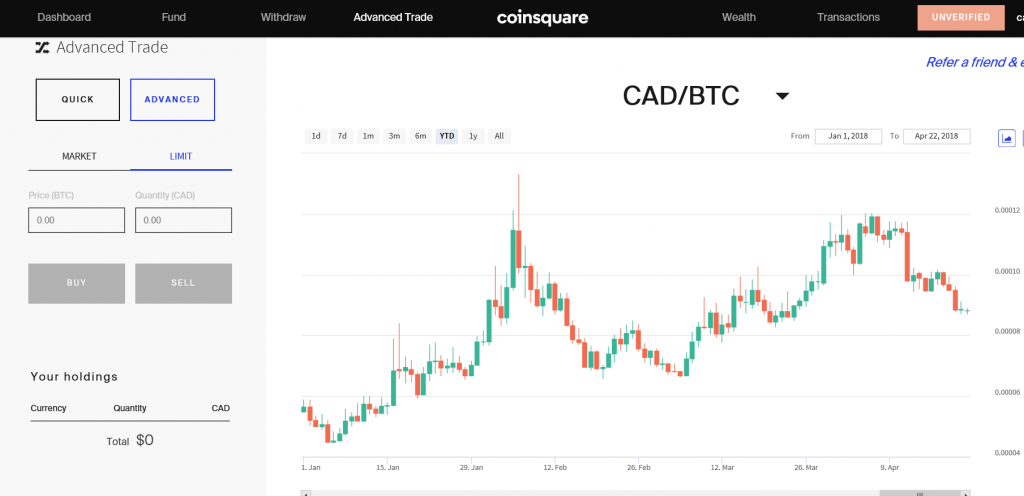Coinsquare is an interesting exchange in several ways. First of all, it was a one-man show for a very long time. That’s right, it was bootstrapped and was run totally by one Virgile Rostand, who is well known in Canadian crypto circles. Despite that it is one of the leading Canadian cryptocurrency exchanges. That’s no longer the case however, and Coinsquare has been aggressively hiring and expanding its teak, with a particular emphasis on high-net worth individuals.
And there’s the other anomaly about Coinsquare. While many cryptocurrency exchanges try to be global players, Coinsquare is dedicated to serving the Canadian cryptocurrency traders. This dedication is evident in the service being provided, and the fact that account verification is only available for Canadian residents. If you live outside Canada they cannot verify your account, making Coinsquare really only suitable for Canadian traders.
About Coinsquare
Coinsquare is based in Toronto Canada, which the company promotes heavily to show its focus on the Canadian cryptocurrency markets. While the company is not regulated, obviously Canada has a very developed financial industry, and one can imagine that this influences the reputation of Canadian based financial companies. It has an additional office in Montreal.
The focus on the Canadian market is further underscored by the fact the Coinsquare currently only accepts residents of Canada as customers, and deposits and withdrawals are primarily in Canadian dollars. While the Canadian dollar is a major currency, followed closely by forex traders, that’s primarily because of its relationship to oil and the U.S. dollar. The Canadian dollar isn’t used extensively outside Canada, as the U.S. dollar and Euro are for example.
In addition to cryptocurrencies, Coinsquare offered trading in precious metals from its inception until April 11, 2018 at which time it discontinued precious metals offerings. Its blog stated that this was because of changing market conditions around the precious metals, but I have to think that there was some regulatory factors influencing the decision to step away from precious metals too.
On the security side, Coinsquare claims a 95% cold storage policy for cryptocurrencies, which is quite good. Furthermore, the exchange has never suffered a breach or loss from a hacking attempt. Users are encouraged to add two-factor authorization to their accounts, and email verifications are required for all withdrawals. Coinsquare claims that their proprietary trading platform has been built on the same technology as the New York Stock Exchange, implying it is just as secure.
Available Cryptocurrencies
You’re able to buy and sell the following cryptocurrencies at Coinsquare: Bitcoin, Bitcoin Cash, Ethereum, Dash, Dogecoin, Litecoin and Squarecoin. There are rumors of plans to add Monero and Ripple in the near future as well.
The fiat currencies available are only CAD and USD, however as of April 2018 all of the Coinsquare FAQ and documentation instructs you to deposit and withdraw only in CAD, indicating that they could drop support for other currencies in the future. Given the fact that they’ve already dropped support for all but Canadian residents, and support for EUR, GBP and AUD it makes sense that they might only operate in Canadian dollars, although I do feel that’s a bit short-sighted in our global economy.
Deposit Methods
Coinsquare has a number of options for making Canadian dollar deposits as you can see from the chart below. You are also able to deposit in any of the seven supported cryptocurrencies.
Minimum Initial Deposit
Coinsquare does have a minimum initial deposit of CAD$100, which seems reasonable enough, but if you fund with Flexepin the minimum is just $20, which I believe is accessible to pretty much everyone.
Bear in mind that if you do go the $20 Flexepin route for your initial deposit you’ll eventually need $100 to confirm your bank account and make a withdrawal, so you might as well start with the $100 amount.
Margin and Leverage
Leverage and margin trading are not available through Coinsquare, which makes sense since the exchange was focused for so long on beginning traders. However, the exchange has been making many changes, and is beginning to target high-net worth individuals. In addition, they are planning an IPO for September 2018 and having margin trading available before then could help attract more investors. For the time being however, if you need margin trading you’ll have to go somewhere else to trade.
Trading Fees
Coinsquare maintains a transparent fee structure, so there shouldn’t be any surprises when you trade with them. Fees are comparable with the rest of the industry. They charge 0.10% for market makers (the traders who passively provide liquidity to the exchange) and 0.20% for market takers – the ones buying or selling directly at the best possible price. Some exchanges offer a sliding scale for these fees, offering those with greater trade volume lower fees, but this isn’t the case at Coinsqaure.
Additionally a QuickTrade feature is available. It has slightly higher fees, which can go up to 0.4%, depending on the asset class. Note that to change your cryptocurrency to CAD for withdrawal you will need to use this QuickTrade feature.
Trading Platform
Most of the trading at Coinsquare is done through their web-based interface, although they do have a mobile app available. If you’re a bit experienced and use any kind of technical or chart analysis for your trading you’ll be disappointed with the charting capabilities at Coinsquare, because they’re basically non-existent beyond presenting a simple chart to look at. Here’s how it looks:
This is actually the “Advanced” charting section and it’s pretty much all you’ll get, although there is order book data below the chart. There are no indicators however, not even a simple moving average or the ability to include support/resistance lines. It’s very bare bones, which I suppose is enough if you’re a beginning trader. Others can get their charting elsewhere. One great benefit you get when trading through Coinsquare is that CAD/BTC and CAD/ETH liquidity is quite good, which is something you won’t get at other exchanges.
Customer Support
Like most cryptocurrency exchanges there is no phone support at Coinsquare. There is also no online chat or email support. Instead they use a ticketing system, with a fairly comprehensive FAQ section to answer most basic questions. Personally I don’t find this to be acceptable for any exchange, and I feel the industry as a whole needs to improve on this approach to customer service.
Coinsquare has also been the subject of complaints in the past due to very slow response time to submitted tickets, but this is when Mr. Rostand was still running the site single-handedly. Since he has begun adding staff response time’s have reportedly improved.
In Conclusion
If you’re Canadian you might like the ease of use you’ll get from Coinsquare. If you aren’t Canadian there’s no reason to even consider the exchange, since they’ve decided to focus exclusively on the Canadian market. It’s good to see the exchange is growing and adding additional staff, as the founder was getting a bit overwhelmed by the demands of running the exchange himself.
The emphasis on security is a good feature, as is the option to trade seven different cryptocurrencies. Beginning traders could do far worse, but experienced cryptocurrency traders will likely find the offerings and the site too basic for their needs.
We’re not sure what direction the exchange is planning on taking, but given the new emphasis on high-net worth individuals and the upcoming IPO I would be surprised if they don’t re-enable support for residents outside Canada. Once it’s a publically traded company I would imagine the investors will almost demand it.


